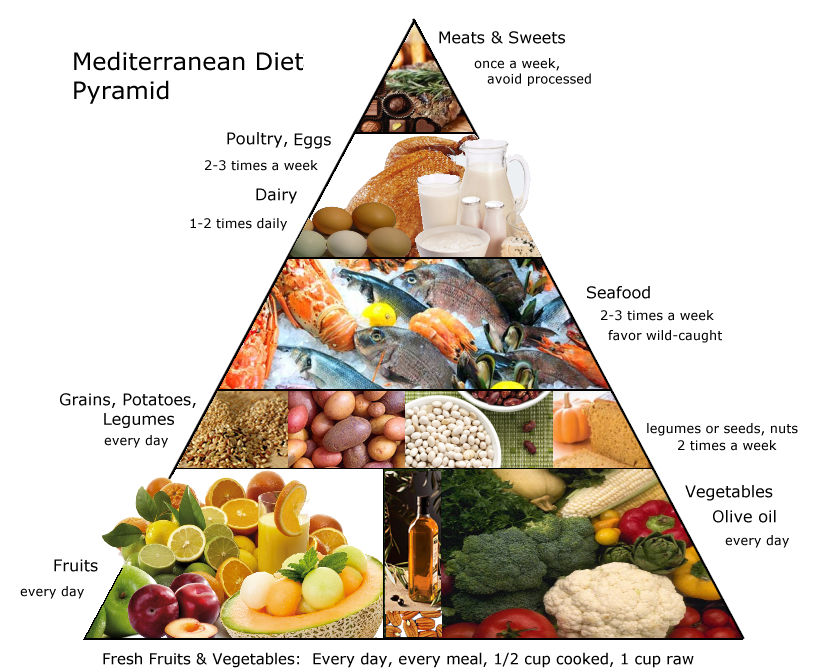By Lana Barhum
Published on June 12, 2024
Medically reviewed by Phoowanai Ektheerachaisakul, RDN
The Mediterranean diet is a way of eating based on the traditional cuisines of countries bordering the Mediterranean Sea. The Mediterranean diet follows the current dietary guidelines of the American Heart Association.1 It’s been found to reduce the risk of heart disease and some cancer types, help with weight loss, improve blood sugar and blood pressure, and more.
This article covers the basics of the Mediterranean diet, its potential benefits and risks, tips for creating a diet plan, and a list of foods to include.
What Is the Mediterranean Diet?
The Mediterranean diet is based on traditional foods eaten by people in countries bordering the Mediterranean Sea, including Italy, Spain, Greece, Lebanon, Cyprus, and Morocco.

Researchers have found people from these countries are generally healthier and have a lower risk for chronic diseases compared to people in many other parts of the world, and they credit this to their diets and overall lifestyle.2
The diet varies because of cultural differences, ethnic and religious backgrounds, geography, agriculture, and economy. Common factors include an emphasis on eating plenty of plant-based foods, eating dairy in moderation, and using olive oil as a primary fat source.3
Fish and poultry are more common than red meat. Wine can be consumed moderately, and fruits are a typical substitute for sugary desserts.
Potential Benefits and Risks
The Mediterranean diet is primarily lauded for promoting heart health, but it’s known for other benefits as well, including reducing cancer risk, promoting weight loss, and improving blood pressure.
Heart Disease Risk Reduction
Research has consistently shown the Mediterranean diet effectively reduces the risk of cardiovascular disease. One 2019 Circulation Research review of studies on the effect of the Mediterranean diet on cardiovascular disease found the evidence for this diet was solid and consistent.4
The report’s authors note conformity with the Mediterranean diet could improve cardiovascular health and reduce the risk of stroke and total cardiovascular disease.
Improved Blood Pressure
The Mediterranean diet includes vegetables, fruits, legumes, nuts, seeds, and healthy fats. It discourages foods high in salt and saturated fats, which could lead to lower blood pressure in the long term.
One study reported in 2017 aimed to determine how strict adherence to the Mediterranean diet would affect blood pressure and endothelial (linings of the blood vessels and lymph vessels) function.5 Researchers found adults who consumed the diet had significantly lower systolic blood pressure and improved endothelial function over six months.
Systolic Blood Pressure vs. Diastolic Blood Pressure
Systolic blood pressure is the top blood pressure measurement, which measures the force the blood exerts on the walls of the arteries each time the heart beats.6 The bottom number is called the diastolic blood pressure, which measures the force the blood exerts on the walls of the arteries in between beats.
Reduced LDL Cholesterol
The Mediterranean diet is a healthy way to lower low-density lipoprotein (LDL) cholesterol (considered “bad” cholesterol) and triglyceride levels, while increasing high-density lipoprotein (HDL) cholesterol (considered “good” cholesterol).
One 2017 randomized control study found that strict adherence to a Mediterranean diet that included extra virgin olive oil could decrease LDL levels in people at high risk for cardiovascular disease.7
Prevention or Management of Type 2 Diabetes
Healthy eating is vital to preventing and managing type 2 diabetes, and the Mediterranean diet may help to achieve this.
In a PREDIMED (Prevención con Dieta Mediterránea, or Prevention with Mediterranean Diet) trial reported in 2014, study participants without diabetes followed either a Mediterranean diet supplemented with extra virgin olive oil, a Mediterranean diet supplemented with nuts, or a low-fat diet.8
Compared to the low-fat diet, those on the Mediterranean diet with olive oil supplementation for four years had a 40% risk reduction for diabetes. Those on the Mediterranean diet with nut supplementation had an 18% risk reduction for diabetes.
Slow Down Cognitive Decline
A systematic review and meta-analysis explored the association between the Mediterranean diet and cognitive health among healthy adults.9 It concluded people who adhered to the Mediterranean diet may reduce the risk of mild cognitive impairment and Alzheimer’s disease.
The study also found positive associations with global cognition (thinking and memory in general), working memory, and episodic memory. It is recommended as a therapeutic diet to prevent or delay cognitive disorders and improve cognitive functions.
Weight Loss
If you are looking for a diet that can help you to lose weight, the Mediterranean diet is a healthy choice. One large study found following this diet could reduce your risk for abdominal obesity and help you keep weight off.10
The Mediterranean diet can work for weight loss because it is based on shifting your relationship with food for the long term, and many of the foods on the diet are healthful and beneficial for weight loss or preventing weight gain.
The Mediterranean diet emphasizes plant-based foods and healthy fats, promoting not only whole grains, fruits, and vegetables, but also beans and nuts with drizzles of extra virgin olive oil. The meal plan and eating patterns align with the Dietary Guidelines for Americans, 2020–2025.
For example, fruits, vegetables, and whole grain foods are filling and can help you stay fuller, and they are loaded with fiber, which aids in weight loss.10 The diet also encourages limited sugars and processed foods since they are linked to weight gain. People on the diet are advised to make wise choices and watch portion sizes.
EXERCISES FOR OVERWEIGHT | OBESE PEOPLE. SET NO. 1: GENERAL EXERCISES TO STRENGTHEN MUSCLES AND IMPROVE JOINT MOBILITY
Arthritis Pain Improvement
A systematic review of studies found the Mediterranean diet results in significant decreases in subjective pain when compared to ordinary diets, although the quality of the evidence was low. Still, the study noted that the benefits from the diet were likely due to the high anti-inflammatory properties in foods typical for the diet.11 These foods can help lower the inflammation associated with pain in various forms of arthritis.
One study reported in 2019 of over 4,000 participants found that people with stricter adherence to a Mediterranean diet had a lower risk of pain worsening and symptomatic forms of knee osteoarthritis (considered wear-and-tear arthritis).12
Studies on the diet have found some symptom improvement in rheumatoid arthritis (RA), a type of inflammatory arthritis in which the immune system attacks the synovial linings of joints. One 2018 Rheumatology International review found beneficial effects of the Mediterranean diet for reducing pain and increasing physical function in people living with RA.13
Cancer Protection
The antioxidant-rich and anti-inflammatory effects of the Mediterranean diet may protect the general population against death from certain cancers and all-cause death among cancer survivors.14 These cancers include colorectal, head and neck, respiratory, gastric, liver, and bladder cancers.
Risks
If you have a chronic medical condition, check with your healthcare provider to ensure changes to your diet are appropriate.
It is wise to ensure you get all your nutrients while limiting red meat and dairy. For example, you may need to concentrate on other sources of iron when limiting red meat and other sources of calcium when limiting dairy.15
Be mindful of your fish consumption. Some fish, such as mackerel, shark, and swordfish, may not be as safe as others because they contain the highest amounts of mercury.16 Some safe fish options include salmon, haddock, flounder, freshwater tuna, and shrimp.
While wine is allowed on the Mediterranean diet, alcohol should be avoided by people who are pregnant, have alcohol use disorder, or are taking medications that can interact with alcohol. Alcohol should also be avoided by people with various medical conditions or risk factors.15
Tips for Creating a Mediterranean Diet Meal Plan
Following are ways in which you can benefit from a Mediterranean diet:
- Eat more legumes: According to the Harvard Medical School, you should aim for at least three servings a week of legumes.17 Examples are lentils, beans, peas, and chickpeas.
- Don’t overconsume alcohol: Substitute red wine for beer and other liquors. Men should not drink more than two 5-ounce glasses per day, and women should not have more than one glass per day.17 (Note that the terms for gender or sex from the cited source are used.)
- Focus on meat as a side: You will want to eat meat in moderation and in small portions. With this diet, you can eat lean poultry but want to limit it to 3- to 4-ounce portions.17 Red meat can be eaten occasionally. You will want to eat more fish and aim for two to three servings of fresh or canned fish per week.
- Consume fewer sweets: If you are craving something sweet, consider fresh or poached fruit. (Poached fruit is simmered in a liquid, such as water or wine, and sweetened.) Aim for at least three servings a day of fruit.17
- Cook with olive oil: Olive oil is recommended as a primary added fat to this diet. It can replace other oils and fats like butter and margarine. Some foods naturally contain healthful fats and can be added to your diet. Such foods include nuts (walnuts and almonds), oily fish containing omega-3 fatty acids (salmon and sardines), and avocado.
- Drink plenty of water: Try to drink plenty of water and replace sodas and juices with water.
- Add whole grain bread and other whole grains: Choose whole-grain bread without added sugars or butter. You might consider experimenting with different whole-grain types, including bulgur, farro, and barley.
A Complete Mediterranean Diet Food List
Because the Mediterranean diet is a lifestyle choice, you can easily customize it. It is a diet most people can easily follow.
You will want to choose foods from the approved foods list at every meal. For example, breakfast foods you can eat as part of this diet are oatmeal with your favorite berries, a veggie frittata, overnight oats, or a fruit-nut smoothie bowl.

Other approved foods are listed below.181920
Proteins
You have plenty of protein options to choose from on the Mediterranean diet. Some you will want to eat liberally, others occasionally, and some rarely or never.
Liberally:
- Tofu
- Beans
- Lentils
- Chickpeas
Occasionally:
- Eggs
- Fish and other seafood options
- Chicken or other poultry
Rarely/Never:
- Beef
- Pork
- Processed meat
- Cured meats
Oils and Fat
Liberally:
- Olive oil
- Olives
- Avocados
- Avocado oil
- Walnut oil
Occasionally: Lighter oils, including sesame and walnut
Rarely/Never:
- Margarine
- Butter
- Refined oils (i.e., soybean or canola oil)
Fruits and Vegetables
No fruits or vegetables are off-limits on the Mediterranean diet, and all can be eaten liberally.
Liberally:
- All starchy vegetables (potatoes, corn, and root vegetables)
- All non-starchy vegetables (i.e., artichokes, broccoli, cucumbers, etc.)
- All fruits
EXERCISES FOR OVERWEIGHT/OBESE PEOPLE. SET NO. 2: POWER EXERCISES WITH A GYMNASTIC ELASTIC BAND/TERABAND
Nuts and Seeds
You can enjoy nuts and seeds on the Mediterranean diet, but you will want to eat them in moderation.
Occasionally:
- Walnuts
- Almonds
- Sunflower seeds
- Cashews
- Nut butter (unsweetened), including almond butter and peanut butter
Rarely/Never:
- Sweetened nut butter
- Sugar-coated or sweetened nuts
Grains
Liberally:
- Whole grain bread
- Whole grains (farro, rye, barley, etc.)
- Oats
Occasionally:
- Pasta (choose whole wheat and vegetable or legume-based varieties)
- Polenta
- Couscous
- Whole grain crackers
- Bran cereal
Rarely/Never:
- Snack foods
- Sugary cereals
- Frozen bread, waffles, or pancakes
Dairy
All dairy should be consumed in moderation. Choose low-fat option dairy options whenever possible.
Occasionally:
- Unsweetened Greek yogurt
- Ricotta cheese
- Cottage cheese
- Milk
- Cheese
Rarely/Never:
- Sweetened yogurt varieties
- Processed cheeses (i.e., Cheez Whiz) and cheese products
- Ice cream
EXERCISES FOR OVERWEIGHT/OBESE PEOPLE. SET NO. 3: POWER EXERCISES WITH DUMBBELLS. WEIGHT IS SELECTED INDIVIDUALLY. IT IS RECOMMENDED TO START WITH 1-2 KG
Sweeteners
All sweeteners should be consumed in moderation.
Occasionally:
- Honey
- Small amounts of sugar
- Frozen or dried fruits
- Pure maple sugar
- Coconut palm sugar
- Brown sugar
Rarely/Never: White sugar
Condiments and Sauces
Liberally:
- Balsamic vinegar
- Lemon
- Tomato sauce without sugar
Occasionally:
- Tahini
- Tzatziki
Rarely/Never:
- Mayo
- Ketchup
- Barbecue sauce
- Teriyaki sauce
Drinks
Liberally:
- Coffee
- Tea
- Water
Occasionally: Red wine
Rarely/Never:
- Sodas
- Fruit juices
- Bottled flavored/sweetened coffee
- Sweet/flavored teas
EXERCISES FOR OVERWEIGHT/OBESE PEOPLE. HYDROTHERAPY MODULE: SWIMMING AND HYDROTHERAPY, EXERCISES IN THE WATER
Herbs and Spices
There are no herbs and spices that are off-limits on the Mediterranean diet.
Liberally:
- Oregano
- Basil
- Chives
- Garlic
- Rosemary
Occasionally: Salt
Foods to Avoid
When following the Mediterranean diet, you will want to limit or avoid processed foods and ingredients. Foods and food ingredients to avoid include:
- Added sugars in many foods, including syrups, baked goods, and ice cream
- Processed foods, including fast food, microwave meals, and popcorn
- Processed meats, such as hot dogs and deli meats
- Refined grains like white bread, chips, and pasta
- Refined oils, including canola oil and soybean oil
- Trans fats, which can be found in fried foods and margarine
By Lana Barhum
Barhum is a freelance medical writer with 15 years of experience with a focus on living and coping with chronic diseases.

DEMO VERSION OF GRS WORKOUTS FOR REHABILITATION OF PATIENTS with obesity ON YOUTUBE
Our website presents sets of exercises for the rehabilitation of the patients with obesity in the following areas:
-
EXERCISES FOR OVERWEIGHT/OBESE PEOPLE. SET NO. 1: GENERAL EXERCISES TO STRENGTHEN MUSCLES AND IMPROVE JOINT MOBILITY
-
EXERCISES FOR OVERWEIGHT/OBESE PEOPLE. SET NO. 2: POWER EXERCISES WITH A GYMNASTIC ELASTIC BAND/TERABAND
-
EXERCISES FOR OVERWEIGHT/OBESE PEOPLE. SET NO. 3: POWER EXERCISES WITH DUMBBELLS. WEIGHT IS SELECTED INDIVIDUALLY. IT IS RECOMMENDED TO START WITH 1-2 KG
-
EXERCISES FOR OVERWEIGHT/OBESE PEOPLE. HYDROTHERAPY MODULE: SWIMMING AND HYDROTHERAPY, EXERCISES IN THE WATER
Summary
The Mediterranean diet is a way of eating that incorporates the cuisines of countries that border the Mediterranean Sea. There are no strict rules for following the diet. The diet primarily includes plant-based foods—fruits, vegetables, whole grains, nuts, seeds, and olive oil. It also includes fish, seafood, poultry, and dairy in moderation.
The diet offers many benefits, including reducing the risk of heart disease and certain cancers, reducing weight gain, regulating blood pressure, and improving arthritis pain. It has few risks, but it is still a good idea to check with your healthcare provider to ensure the diet is safe with any health conditions you may have or medications you take, and that you are getting all your nutrients.
Sources
https://www.verywellhealth.com/mediterranean-diet-food-list-8659635
- American Heart Association. What is the Mediterranean diet?
- Lăcătușu CM, Grigorescu ED, Floria M, Onofriescu A, Mihai BM. The Mediterranean diet: from an environment-driven food culture to an emerging medical prescription. Int J Environ Res Public Health. 2019;16(6):942. doi:10.3390/ijerph16060942
- Krznarić Ž, Karas I, Ljubas Kelečić D, Vranešić Bender D. The Mediterranean and Nordic diet: a review of differences and similarities of two sustainable, health-promoting dietary patterns. Front Nutr. 2021;8:683678. doi:10.3389/fnut.2021.683678
- Martínez-González MA, Gea A, Ruiz-Canela M. The Mediterranean diet and cardiovascular health. Circulation Research. 2019;124(5):779-798. doi:10.1161/CIRCRESAHA.118.313348
- Davis CR, Hodgson JM, Woodman R, Bryan J, Wilson C, Murphy KJ. A Mediterranean diet lowers blood pressure and improves endothelial function: results from the MedLey randomized intervention trial. Am J Clin Nutr. 2017;105(6):1305-1313. doi:10.3945/ajcn.116.146803
- American Heart Association, Understanding blood pressure readings.
- Hernáez Á, Castañer O, Goday A, et al. The Mediterranean diet decreases LDL atherogenicity in high cardiovascular risk individuals: a randomized controlled trial. Molecular Nutrition & Food Research. 2017;61(9):1601015. doi:10.1002/mnfr.201601015
- Salas-Salvadó J, Bulló M, Estruch R, et al. Prevention of diabetes with Mediterranean diets: a subgroup analysis of a randomized trial. Ann Intern Med. 2014;160(1):1–10. doi:10.7326/M13-1725
- Fu J, Tan LJ, Lee JE, Shin S. Association between the Mediterranean diet and cognitive health among healthy adults: a systematic review and meta-analysis. Front Nutr. 2022;9:946361. doi:10.3389/fnut.2022.946361
- Agnoli C, Sieri S, Ricceri F, et al. Adherence to a Mediterranean diet and long-term changes in weight and waist circumference in the EPIC-Italy cohort. Nutr Diabetes. 2018;8(1):22. doi:10.1038/s41387-018-0023-3
- Schönenberger KA, Schüpfer AC, Gloy VL, Hasler P, Stanga Z, Kaegi-Braun N, Reber E. Effect of anti-inflammatory diets on pain in rheumatoid arthritis: a systematic review and meta-analysis. Nutrients. 2021;13(12):4221. doi:10.3390/nu13124221
- Veronese N, Koyanagi A, Stubbs B, et al. Mediterranean diet and knee osteoarthritis outcomes: a longitudinal cohort study. Clin Nutr. 2019;38(6):2735-2739. doi:10.1016/j.clnu.2018.11.032
- Forsyth C, Kouvari M, D’Cunha NM, et al. The effects of the Mediterranean diet on rheumatoid arthritis prevention and treatment: a systematic review of human prospective studies. Rheumatol Int. 2018;38(5):737-747. doi:10.1007/s00296-017-3912-1
- Morze J, Danielewicz A, Przybyłowicz K, Zeng H, Hoffmann G, Schwingshackl L. An updated systematic review and meta-analysis on adherence to Mediterranean diet and risk of cancer. Eur J Nutr. 2021;60(3):1561-1586. doi:10.1007/s00394-020-02346-6
- MedlinePlus. Mediterranean diet.
- Food and Drug Administration. Advice about eating fish.
- Harvard Medical School. A practical guide to the Mediterranean diet.
- Department of Agriculture. Dietary Guidelines for Americans, 2020-2025.
- National Cancer Institute. The Mediterranean eating plan.
- Oldways. Mediterranean diet.





